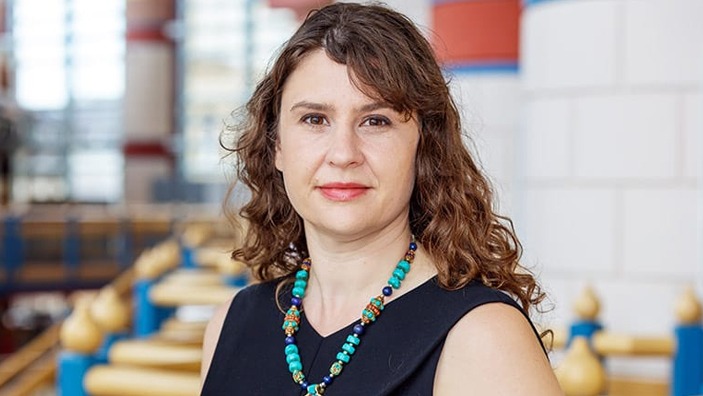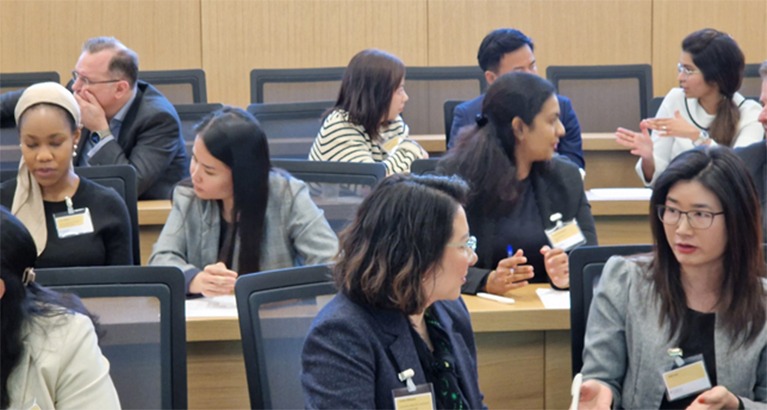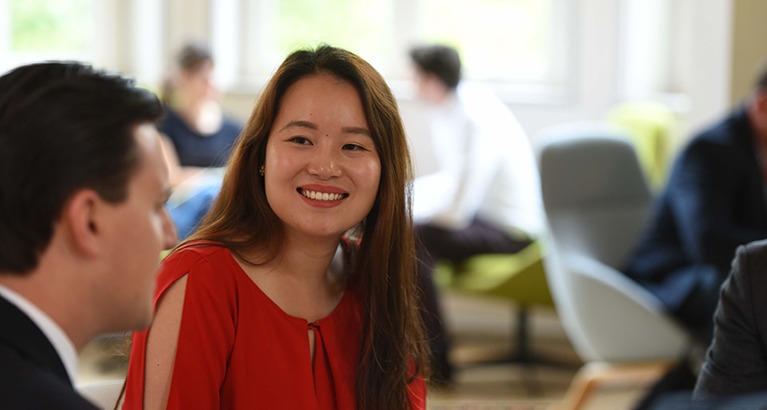
There is a clear gender gap in entrepreneurship: this is reflected in a widening gap in self-employment in Europe identified in a recent Eurostat survey, as well as a recent decline in US venture capital funding to women-led ventures.
This often reflects gendered norms or ways of thinking that reflect stereotypes such as that women are more risk-averse than men – and these are reflected in television programmes like ‘The Apprentice’ or ‘Silicon Valley’ featuring a stereotypical alpha male.
Looking for a theoretical approach gendered norms in entrepreneurship
How to break down these norms has been the focus of extensive research by Monique Boddington, Management Practice Associate Professor at Cambridge Judge Business School and Deputy Director of the Business School’s Master of Studies in Entrepreneurship degree.
As for the willingness to take on risk, Monique points out that there are different types of risk (skydiving is not the same as buying low-grade but high-yielding bonds), and that risk in entrepreneurship has usually been defined in terms of financial risk rather than a broader definition that looks at balancing career and personal goals.
But Monique’s research into entrepreneurship and gender goes far deeper, seeking a theoretical approach to how the interaction of individual action and collective activities such as workers’ collectives and virtual communities can help break down gendered norms.
Changing our perception of what an entrepreneur looks like
“I was drawn to this topic because while there have been numerous studies about how gendered norms inhibit entrepreneurial practice, I wanted to explore how individualised practice and identity can shift those norms,” says Monique.
“Over time, I became convinced that significant long-term change requires structural renegotiation in the form of a shift in the stereotypes we hold around entrepreneurship: what does an entrepreneur look like and what characteristics do they have? For example, when we think about entrepreneurship, it is often thought about in terms of risk-taking, breaking things, going fast. Further, when asked ‘Who is an entrepreneur?’, or to name an entrepreneur, most people will think of or name a man.
“Society, is structured around these ideas, and these then reinforce the way we act, like the way funding is allocated. Individuals who demonstrate characteristics that mirror our idea of what a successful entrepreneur looks like are more likely to receive funding. Thus, to create real long-term change, to support those who do not fit with the stereotype, we need to renegotiate the structural norms that guide our behaviours . We need to broaden our conception of what and who an entrepreneur is.”
Are efforts to change the gendered norm futile or can collective action change things?
In her research, Monique draws on the contrasting views of 2 well-known figures in the field – French sociologist Pierre Bourdieu, who published numerous papers between the mid-1970s and around the turn of the Millennium, and British sociologist Margaret Archer, whose papers include several gender-related studies between 2000 and 2015.
Bourdieu wrote about how, as Monique describes it, “the very idea of a woman entrepreneur is outside the norm”, so efforts to change this gendered norm “are futile, as the normative order is naturalised”. This has translated into entrepreneurs being socially expected to embody masculine characteristics, and by further extension to be male.
Archer, on the other hand, wrote a series of papers explaining what Monique’s research describes as the “increasing variability within society as social norms break down”. Archer also focuses on a concept of ‘reflexivity’ (in which people examine their own views) which emphasises how individuals have the potential through collective action to change structural norms. Change requires more than just individuals but collaborative efforts of groups, advocacy groups, social movements, community-based initiatives and online campaigns – which can provide mentoring and education while lobbying government for policies that support more diverse entrepreneurship. A great example are funds focused on investing in women like Astia or the Female Founders Fund.
Why a postfeminist perspective is needed on gender and entrepreneurship
The goal, as Monique describes it, is to facilitate the conceptualisation of gender from a postfeminist perspective in which a woman entrepreneur’s position is “not conceived of as exclusion to a dominant male norm”.
“Such reflexivity can help facilitate structural shifts, but given how deep-seated these gender norms are in entrepreneurship it will require ongoing collective action. This is not something that will be change overnight or even in a decade, and therefore initiatives like women-focused funds, or educational initiatives to provide mentoring will be needed in the long term So at the moment, we have got much better at supporting women starting businesses, but where the biggest issue is in scaling we need more support to help women grow – advice and money” says Monique, whose research on gender issues has also looked at the prospective motherhood penalty in which some women face career obstacles because employers believe they may take time off to raise children.
“There are some parallels between my research on gender and entrepreneurship and the study on the prospective motherhood penalty,” says Monique. “In both cases perceptions often don’t reflect reality, and the perceptions are mostly from a perspective of male-dominated power structures.”
5 key findings on gender and entrepreneurship
We asked Monique to take a deeper dive into some aspects of her research on gender and entrepreneurship.
1
Research needs to focus on how to break down gendered norms
It’s easier to identify a few successful female entrepreneurs than to figure out how to break down gendered norms. Previous research has evolved from a focus on the masculine norm of entrepreneurship, to focusing on “feminine” practices such as teamwork, to recognising the fluidity of gender; but we need a better understanding of how feminine practice can lead to shifts in traditional gendered norms.
2
Masculine domination in entrepreneurship limits creativity and innovation
Traditional masculine domination of entrepreneurship limit creativity and innovation. Research has long shown that diversity facilitates creativity, and having people with broader perspectives and experiences will help facilitate new innovations. This masculine domination impacts who is creating by leading to the underutilisation of talent by restricting opportunities to only those who fit the stereotype. There is also a second element, what innovations are harnessed, so many entrepreneurial opportunities are overlooked because they don’t fit the current norms of success; this may be because the idea itself is not seen as fitting or the model of the business. When Sara Blakely started Spanx (shapewear leggings and other fashions), she faced numerous rejections as many couldn’t take the idea seriously. The venture would grow to be worth over $1 billion with no external funding.
3
Gendered norms result in different treatment of genders
Gendered norms in entrepreneurship can result in different ways female and male founders are treated, which further entrenches the problem. Research found that the questions asked of men and women founders often differ; this harm female entrepreneurs in terms of funding decisions in that women were asked risk prevention-focused questions and men were asked forward-looking questions related to promoting the business. This is what Bourdieu referred to as a system self-naturalising through practice, which reaffirms norms that harm women entrepreneurs.
4
It’s important not to oversocialise the concept of identity
Instead, we need to recognise a middle ground between seeing an individual as acting completely autonomously and viewing every human practice as a product of social structures. I’m drawn to Archer’s social realism that distinguishes between the person and the actor. She once said: “I never wholly live in varieties of human space, but am always rooted in natural and non-human space.”
5
Popular entrepreneurship terminology misrepresents women’s contributions
Some of the popular terminology around entrepreneurship has been detrimental to women and an understanding of their contributions. Terms like unicorns (start-up firms valued at $1 billion or more) and gazelles (a fast-growing firm at least four years old) focus on valuation or other economic benchmarks, but don’t recognise other value such as personal development and quality of life – and financial measures also limits what is viewed as success.
Future research needed on gender bias in entrepreneurship
Monique identifies 3 possible areas for future research on this area.
1
Supporting women entrepreneurs and those who don’t fit traditional norms
Monique would like to see more research on how entrepreneurs collectively organise to support women entrepreneurs and those, who do not fit into traditional social norms of entrepreneurship. Further and ongoing support is needed to facilitate gender equity in entrepreneurship. It is critical to draw attention to and replicate new ways that people are coming together to provide support or facilitate change. Part of this is also understanding how women navigate the current dynamics and understanding where barriers remain, but also, celebrating successes.
2
Intersections of Gender in Entrepreneurship with other demographics
There has been a dominance of whiteness in the literature that restricts our fuller understanding. We need research into how gender in entrepreneurship also interacts with race and ethnicity, age, class, sexual orientation and disability. This could help in breaking down more barriers than only gender-based obstacles.
3
Examining the term ‘value’ in the context of entrepreneurship
Like ‘success’ the term ‘value’ needs closer examination in the entrepreneurial context. Social enterprises, for example, reflect different definitions of value that encompass social purpose. There is also a bias in favour of high-growth ventures, which reinforces gender norms by often stigmatising low-growth but useful firms as lifestyle businesses.
Featured faculty
Monique Boddington
Management Practice Associate Professor
Featured research
Boddington, M. (2024) “Reshaping gendered norms in entrepreneurship: incorporating gender identity and entrepreneurial practice.” Gender, Work and Organization (DOI: 10.1111/gwao.13075) (published online Sep 2023)





